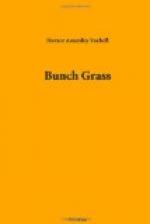“Ah! the buzzards.” I shivered, seeing once more those grim sextons of the Pacific seaboard.
“I found the right place; and just then I saw the stage crawling up the grade. Immediately the excitement of a new sensation gripped me. I had a taste of it when I opened your safe. It seized me again, relentlessly. If I were successful, I might begin again; if I failed, I could shoot myself without imposing an atrocious remorse upon you. Well, the pluck of that driver upset my plans—the plans of an amateur. I ought to have held them up on the upgrade.”
“And after you failed——”
“Ah! after I failed I had a lucid interval. Don’t laugh! I was hungry and thirsty. The most pressing need of my nature at that moment was a square meal. I walked to a hotel, and was nailed. Your brother’s letter to the cashier saved me. I realised dimly that I had become respectable, that I looked—for the deputy sheriff told me so—an English gentleman—Mr. Johnson, your friend. That’s about all.”
“All?” I echoed, in dismay.
“The rest is so commonplace. I got a small job as clerk in a fruit-packing house. It led to better things. I suppose I am my father’s son. I failed to make a living, spoiling canvas, but as a business man I have been a mild success.”
“And what are you doing now?”
“I buy and sell claret. Any other question?”
“Yes. How did you open our burglar-proof safe?”
Johnson laughed.
“My father was a manufacturer of safes,” he answered. “I know the tricks of my trade.”
IX
UNCLE JAP’S LILY
Jaspar Panel owned a section of rough, hilly land to the north-east of Paradise. Everybody called him Uncle Jap. He was very tall, very thin, with a face burnt a brick red by exposure to sun and wind, and, born in Massachusetts, he had marched as a youth with Sherman to the sea. After the war he married, crossed the plains in a “prairie schooner,” and, eventually, took up six hundred and forty acres of Government land in San Lorenzo County. With incredible labour, inspired and sustained by his natural acuteness, he wrought a miracle upon a singularly arid and sterile soil. I have been told that he was the first of the foothill settlers to irrigate abundantly, the first to plant out an orchard and vineyard, the first, certainly, to create a garden out of a sage-brush desert. Teamsters hauling wheat from the Carisa plains used to stop to shake the white alkaline dust from their overalls under Uncle Jap’s fig trees. They and the cowboys were always made welcome. To such guests Uncle Jap would offer figs, water-melons, peaches, a square meal at noon, and exact nothing in return except appreciation. If a man failed to praise Uncle Jap’s fruit or his wife’s sweet pickles, he was not pressed to “call again.” The old fellow was inordinately proud of his colts, his Poland-China pigs, his “graded” bull, his fountain in the garden.




